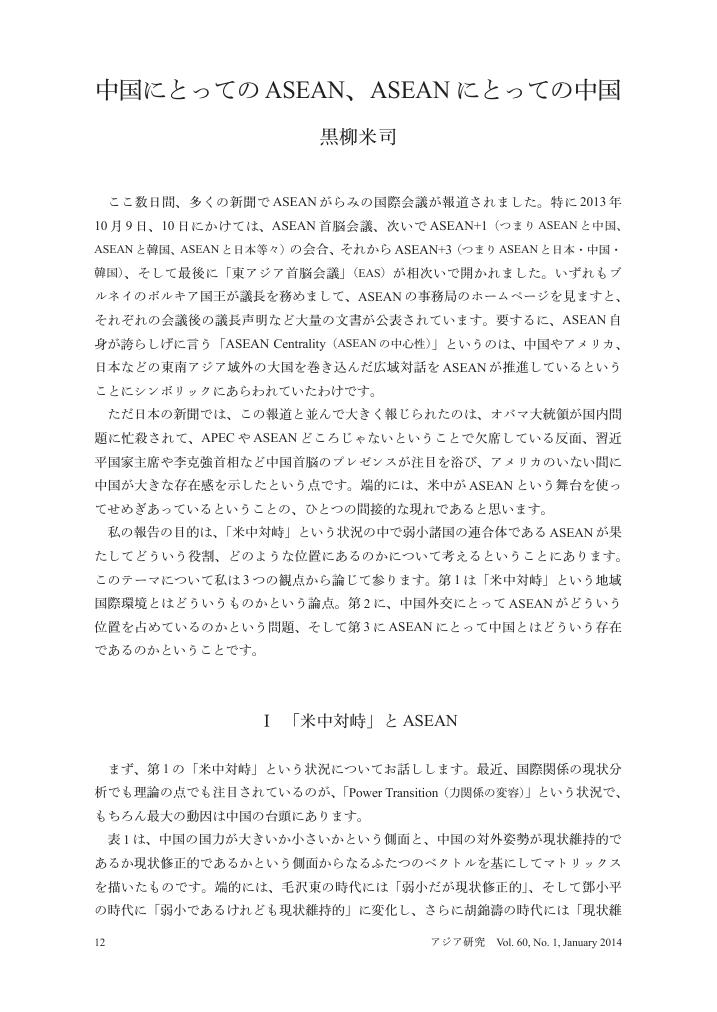2 0 0 0 OA グローバリゼーションとインドネシア : 岐路に立つワヒド政権
- 著者
- 黒柳 米司
- 出版者
- 東京大学大学院総合文化研究科附属アメリカ太平洋地域研究センター
- 雑誌
- アメリカ太平洋研究 (ISSN:13462989)
- 巻号頁・発行日
- vol.1, pp.157-171, 2001-03
Only one year after his globally-appreciated inauguration, President Abdurrahman been besieged by the hostile forces both in the parliament as well as on the streets. It was those same forces that hailed Wahid as the President of Indonesia in October 1999. The inter-national reputation of the President Wahid also waned to the critical extent that even the reevaluation of the stabilizing role of the Indonesian military becomes arguable, that was diametrically opposite to the political atmosphere in the wake of the downfall of the ex-President Soeharto. What made those radical changes take place? Gus Dur, as Wahid is widelly called, has been criticised for failures in three major tasks: promoting democratization, economic rehabilitation, and pacifying restive regions. His poor performance contravenes his overtly adamant attitudes toward increasingly antagonistic MPs, who issued the first memorandum of censure to the President in February 2001. Ironically enough, while there is no reason to doubt Gus Dur's commitment to democracy and reformasi, he is undeniably autocratic in his modus operandi. The trend of globalization or, to be more concrete, global pressures - influences those Indonesian developments in two ways. On the one hand, it may provide the democratic enthusiasts with incentives for as well as models of democratization. Internet technologies, among others, helps democratic NGOs in an unprecedented manner, for them to make their appeals heeded and find a trusty shield from possible sanctions by the regime. On the other hand, it may backfire by instigating nationalistic repercussions to external pressures perceived by the locals - both government and populace as biased and illegitimate interference. As a matter of fact, global standards, rather often than not, used to represent the views and values of the Western, developed nations which the developing nations, specially in Asia, are skeptical of and resentful of as well. he government of President Abdurrahman Wahid could be dubbed as a 'mezzanine regime'in the sense that it could climb up the stairs leading to a fully democratic Indonesia on he one hand, or descend downward to an autocratic military regime on the other. The international community, therefore, should not take democratization in Wahid's Indonesia for ranted. While the former President Soeharto has politically deceased, those pro-Soeharto elements are far from extinguished from positions of power in central and local governments. hey could make use of anti-Wahid momentum - both local and global - as an excuse to make a come-back.
1 0 0 0 OA 中国にとってのASEAN、ASEANにとっての中国
- 著者
- 黒柳 米司
- 出版者
- 一般財団法人 アジア政経学会
- 雑誌
- アジア研究 (ISSN:00449237)
- 巻号頁・発行日
- vol.60, no.1, pp.12-17, 2014-10-15 (Released:2014-10-25)
- 参考文献数
- 2
- 著者
- 黒柳 米司
- 出版者
- 大東文化大学
- 雑誌
- 国際比較政治研究 (ISSN:09189092)
- 巻号頁・発行日
- vol.7, pp.五三-六二, 1998-03
1 0 0 0 OA 地域国際環境の変容とASEAN型地域主義
(1)米国の対ASEAN政策の積極化、(2)中国の存在感の顕著な増幅、(3)日本の存在感の長期的凋落、および(4)「地域としての東アジア」の顕在化などという方向で変容する地域国際環境の下でASEANは、(1)「ASEAN憲章」の採択・発効、(2)インドネシア民主主義の確立などの成熟を示したものの、(3)タイの軍事クーデター、(4)タイ=カンボジア武力衝突、(5)ミャンマー軍政の民主化停滞など、後退局面がこれを上回りつつある。
1 0 0 0 中国とアジア太平洋の広域世界
計画研究「中国とアジア太平洋の広域世界」は、研究分担者6名、公募研究者6名、研究協力者2〜3名による共同研究を進めてきた。3年間にあわせて15回の研究会を行い、そのうち2回は領域研究の他の班(中華世界班、社会班)と、1回は特定領域研究「南アジアの構造変動とネットワーク」の世界システム班と合同で開催し、学際的研究を進めた。また、第5回研究集会において「アジア太平洋世界と中国」セッションを主宰し、班の研究成果を領域研究全体で共有するよう努めた。3年間の研究活動の結果、次のような共通認識を持つに至った。(1)冷戦の終結は、米ソ中3極構造を崩壊させ、中国を「地域化」させた。中国の影響力および経済関係は、アジア太平洋地域にほぼ限定され、その外交戦略もまた、近隣のアジア諸国との関係緊密化によって、平和な環境を維持し、アメリカの「脅威」に対処するものである。(2)東南アジア諸国には新たな「中国脅威論」が浮上しているが、これは、中国の「建設的関与」促進によって緩和可能と考えられていること、華人はもはや争点でないことの2点において、冷戦期の「脅威論」とは質的に異なっている。(3)経済的には、香港・台湾を含む華人ネットワークが中国の発展の重要要因となっている。とくに、広東・福建の僑郷(香港住民・海外華人の出身地区)の発展は、ほぼ全面的に彼らに依存してきた。このため、北京も僑郷地区も海外華人との連係強化に懸命である。(4)これらの動向は、いずれも何らかの構造的変化を示すものであり、1997年の香港返還およびアジア経済危機がさらなる構造変動を促すことかどうか注目される。

